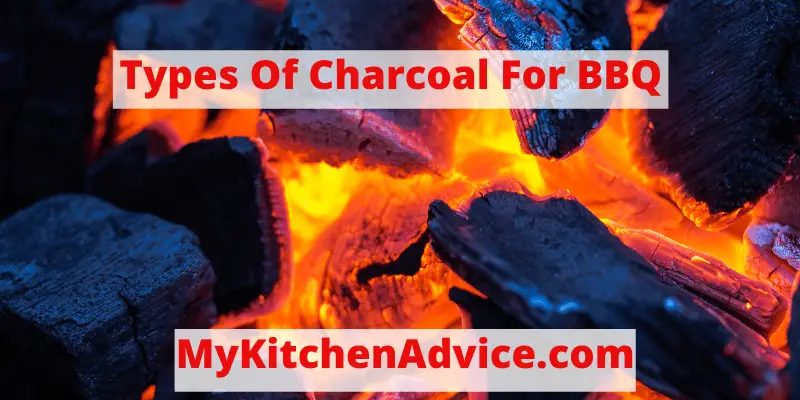Do you face trouble more often while setting up charcoal for grilling? It is indeed a bit confusing to select the appropriate charcoal especially if barbequing is new to you. There are different varieties of charcoal in the market. So, how do you select the perfect charcoal for a griller?
As a professional chef, I have experience using different types of charcoal in my life. So, I know each and everything about them.
In this article, I’m going to talk about 5 different types of charcoal briefly as well as their pros, cons, and usability. So, stay tuned and follow the article.
5 Types of Charcoals for BBQ:
When you visit super shops like Walmart or search Amazon, big bags of charcoal just pop up in front of you. These bags of charcoal carry different names, ingredients, and user manuals on labels. So, these are some of the varieties of charcoal you may find in your local shops or online :
- Lump Charcoal.
- Briquettes.
- Hardwood or Natural Briquettes.
- Binchotan Charcoal.
- Coconut Shell Crushed Charcoal.
A Comparison Among 5 Different Charcoal Types :
Here’s a comparison among 5 different charcoal types. Let’s look at a glance.
| Lump | Briquettes | Hardwood | Binchotan | Coconut | |
| Price | Costly | Relatively cheap | Costly | Cheap | |
| Shape | No shape | Shaped | Convenient Shaped | Shaped | Shaped |
| Productivity | Produce very high heat | High temperature | High Temperature | Burn about 5 – 7 hours | Product odorless high heat |
| Comment | Less Ash articles | Burning Ashes | Takes More TIme to Ignite | No Dust or Ashes | Environment Friendly |
In the later part of the article, I’m going to talk elaborately about these charcoal as well as their advantages and disadvantages.
1. Lump Charcoals :
Lump charcoal, also known as natural charcoal, is made from wood logs mostly; these charcoal are burnt without the presence of oxygen for several days in pits. These charcoals contain a strong wood flavor, reaching temperatures of nearly 1000 degrees.
Pros of Lump Charcoal :
- Hot Temperature.
- Lights Quickly.
- Less Ash articles.
Cons of Lump Charcoal :
- Hard to Control Temperature.
- No Accurate Shape
- Needs More In Amount.
- Costly.
When to Use Lump Charcoal :
When your food needs a quick searing like crusty medium-rare steaks, lump charcoal will do just fine. If you go for a low and slow cooking method, the temperature of lumps should be kept as low as possible.
2. Briquettes:
Briquettes are a convenient presentation of lump charcoal. Generally, they are made from wood leftovers, sawdusts, and binding chemicals like limestone, igniting materials such as nitrate, and other things. Briquettes are widely used charcoal for their numerous advantages.
Pros of Briquettes:
- Convenient Shaping
- Long Lasting Burning Time.
- A Stable Temperature.
Cons of Briquettes:
- Leaves Chemical Burning
- Takes More Time to Ignite.
- Burning Ashes.
When to Use Briquettes:
Most briquettes are coated with self-igniting materials. That means this charcoal is ideal for on-the-go situations and tough weather when there is less air to ignite. Also, they are ideal for grilling foods that need constant temperature.
3. Hardwood or Natural Briquettes:
When natural lumps are blended with some plaster or binder such as starch to give them the desired shape these are then known as hardwood or natural briquettes. They are almost the same as natural briquettes with some additional benefits.
Pros of Hardwood Briquettes:
- Convenient Shaping.
- Long Lasting Burning Time.
- High Temperature.
- Slow Burning.
Cons of Hardwood Briquettes :
- Hard to Control Temperature.
- Needs More Amount.
- Takes More TIme to Ignite.
When to Use Hardwood Briquettes :
Hardwood briquettes come with a pillow or standard shaping, which means they can be used as a coal plate inside a griller. Unlike natural coles which leave spaces between them resulting in uneven cooking.
4. Binchotan Charcoal :
Traditionally made from the branches of oak trees, Binchotan is a symbol of Japanese culinary culture. The process of making Binchotan is long and takes time. However, the end product is worth spending for.
Pros of Binchotan:
- Long Lasting Burning Time (5-7 Hours ).
- Steady Temperature.
- Natural Oak Flavor.
- No Dust or Ashes.
Cons of Binchotan:
- Very Costly.
- Not Convenient to Every Type of Grilling.
- Difficult to Master The Heat Control.
When to Use Binchotan :
Bichons are long burning charcoal and produce a tremendous amount of heat. That means foods that need a long time to get ready can be cooked with it. You can keep the food in indirect heat too, they will cook evenly with the heat of binchotan.
5. Coconut Shell Charcoal :
Coconut charcoal is made from the distilled shells of coconut, commonly used as a cheap alternative to lumps and briquettes. As coconut shells don’t have any flavors, they are good neutral fuel for barbeque-flavored items.
Pros of Coconut Shell Charcoal:
- Long Lasting Burning Time.
- Environment Friendly.
- Odorless and High Heat Producer.
- Less Costly.
Cons of Coconut Shell Charcoal:
- May Cause Irritations In Body.
- Not Recommended for Regular Use.
- Can Spread Toxicity In The Long Term.
When to Use Coconut Shell Charcoal :
Coconut shell charcoal is a cheap alternative to traditional briquettes. Although it is mostly used for industrial use, you can try this sometimes when you run out of your lump or Briquettes.
Related Questions:
Is Wood Smoking Better Than Charcoal Barbeque?
Well, wood smoking gives your food a subtle smokey and woody flavor. These charcoal are perfect for you if you want slow-cooked juicy meat. On the other hand, charcoal is perfect for the quick searing of food. So next time you are barbecuing, keep both kinds of woods for flavors and charcoal for grilling.
Can I Use Charcoal As A Smoker?
A charcoal griller can also be used as a smoker. To do this you need water-soaked wood chips. Place them with charcoal while igniting a fire. Also to contain moisture inside the griller, you can keep a big pot full of water inside. Place your food in indirect heat and let it smoke.
Is Charcoal Barbeque Bad For Health?
When you’re grilling with charcoal, it is wise to keep a mask on your face. Burned smoke and carbon particles can be a problem for your respiratory system and lungs. Also, don’t stand frequently near charcoal grillers while cooking food, you’ll inhale burned smokes of charcoals resulting in sneezing or coughing.
Are Natural Lumps Better Than Briquette Charcoals?
Lumps are natural charcoal made from burned wood. They don’t contain additional chemicals thus good for your food. But it is hard to control the temperature of these coals and they burn very quickly.
Briquettes, on the other hand, are a mix of many artificial things. They burn long and have even shapes. But leaves ashes and an odd smell in food. So choose what suits your cooking. If you can control heat like a pro, go for lumps, if you want easy burning, briquettes are for you.
Which Charcoal Is Best for Outdoor Activities?
When you’re in outdoor activities such as hiking, picnic, or trekking, you’ll likely want a quick and hazard-less barbeque. In that case, self-igniting briquettes can be a good option. They are generally coated with chemicals that catch fire on the go. If you want precision in cooking, use lump charcoal.
Can I Reuse Burned Charcoal for Grilling?
If you have burned charcoal such as natural lumps in your griller, it is possible to use the leftover pieces again. Just keep the water over them. This will freeze the coals instantly. Then leave these pieces until they dry completely for reuse.
Final Words :
Charcoal is the primary source of fuel for natural and smokey grilling. There are several types of charcoal in the market. Each of them has its advantages and cons. So it will be good for you if you have a clear idea about different charcoals and their use, which will help you choose the right packet of charcoal for your next summer barbeque or grilling on a mountain top.


